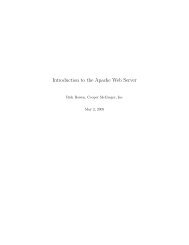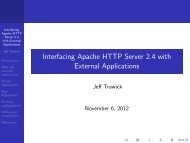Introduction to Apache Qpid Proton - ApacheCon
Introduction to Apache Qpid Proton - ApacheCon
Introduction to Apache Qpid Proton - ApacheCon
Create successful ePaper yourself
Turn your PDF publications into a flip-book with our unique Google optimized e-Paper software.
<strong>Introduction</strong> <strong>to</strong> <strong>Apache</strong> <strong>Qpid</strong> Pro<strong>to</strong>n<br />
Rajith Attapatu<br />
Senior Software Engineer @ Red Hat<br />
rajith@apache.org<br />
Rafael Schloming<br />
Principle Software Engineer @ Red Hat<br />
rhs@apache.org
Overview<br />
●<br />
●<br />
●<br />
●<br />
●<br />
<strong>Introduction</strong><br />
Background<br />
Pro<strong>to</strong>col Engine<br />
Messenger<br />
Summary
<strong>Introduction</strong><br />
●<br />
●<br />
Pro<strong>to</strong>n: A <strong>to</strong>olkit for speaking AMQP<br />
– Includes:<br />
●<br />
●<br />
The AMQP Pro<strong>to</strong>col Engine API<br />
The AMQP Messenger API<br />
Part of the <strong>Apache</strong> <strong>Qpid</strong> project<br />
– <strong>Qpid</strong> is the home for AMQP at <strong>Apache</strong>
Pro<strong>to</strong>n is network based and<br />
decentralized
Pro<strong>to</strong>n Can Scale Transparently.
Pro<strong>to</strong>n is Highly Embeddable<br />
App Servers<br />
windows<br />
Linux<br />
Pro<strong>to</strong>n<br />
Andriod<br />
iOS<br />
Cloud<br />
Browser
Designed For Maximum Embeddability<br />
●<br />
Minimal assumptions about the host environment.<br />
●<br />
Minimal assumptions about the application threading model.<br />
●<br />
Minimal dependencies.
Pro<strong>to</strong>n Design Goals.<br />
●<br />
Multi-language support.<br />
●<br />
●<br />
●<br />
●<br />
●<br />
Pure Java and pure C stacks.<br />
Java Script will be added shortly.<br />
Common design across the language implementations.<br />
Common API across the language implementations.<br />
Designed for easy language bindings. Using swig<br />
– Python<br />
– Ruby<br />
– PHP
Out of the box support for common<br />
data structures<br />
●<br />
Strings<br />
●<br />
Lists<br />
●<br />
Maps<br />
Python App<br />
AMQP<br />
Java App
Pro<strong>to</strong>n is based on a Standard - AMQP
Pro<strong>to</strong>n Provides You With Two Options<br />
●<br />
The AMQP Messenger API, a simple but<br />
powerful interface <strong>to</strong> send and receive message<br />
over AMQP.<br />
●<br />
AMQP Pro<strong>to</strong>col Engine, a succinct encapsulation<br />
of the full AMQP pro<strong>to</strong>col machinery.
Pro<strong>to</strong>col Engine
Messenger API
Background<br />
●<br />
Pro<strong>to</strong>n is a pro<strong>to</strong>col implementation<br />
– Previous attempts <strong>to</strong> standardize messaging<br />
have been client/server based, i.e. RPC<br />
– AMQP 1.0 is a pro<strong>to</strong>col specification<br />
●<br />
●<br />
●<br />
Network oriented: Symmetric, Decentralized<br />
Provides intermediated messaging semantics, but<br />
does not restrict <strong>to</strong> hub and spoke <strong>to</strong>pology<br />
Not just a standard way <strong>to</strong> talk <strong>to</strong> a traditional<br />
broker<br />
– AMQP 1.0 makes a pro<strong>to</strong>col implementation<br />
possible
Background<br />
●<br />
Traditional MOM transformed<br />
– Traditional MOMs conflate both<br />
●<br />
●<br />
s<strong>to</strong>re and forward infrastructure<br />
specialized application behaviors<br />
– special queues: last value, ring queues<br />
– message transformation<br />
– Driven by Scalability and Standardization<br />
●<br />
With AMQP 1.0, these features can be<br />
– distributed, scalable, heterogeneous
Background<br />
●<br />
Many things benefit from speaking AMQP<br />
– A concise expression of a very general set of<br />
messaging semantics<br />
●<br />
●<br />
●<br />
●<br />
Flow control<br />
Settlement<br />
Transactions<br />
Data binding<br />
– Not everyone wants <strong>to</strong> implement all this down<br />
<strong>to</strong> the wire
Background<br />
●<br />
Pro<strong>to</strong>n Goals<br />
– Make it easy <strong>to</strong> speak AMQP<br />
●<br />
●<br />
●<br />
●<br />
minimal dependencies<br />
minimal threading assumptions<br />
multilingual<br />
– C, Java, Javascript<br />
– C Bindings in python, ruby, php, perl, ...<br />
multi-platform<br />
– Linux/unix, windows, android, iOS
Messenger<br />
Sending<br />
messenger = Messenger()<br />
messenger.start()<br />
msg = Message()<br />
msg.address = "0.0.0.0"<br />
msg.body = u"Hello World!"<br />
messenger.put(msg)<br />
messenger.send()<br />
messenger.s<strong>to</strong>p()<br />
Receiving<br />
messenger = Messenger()<br />
messenger.subscribe("~0.0.0.0")<br />
messenger.start()<br />
msg = Message()<br />
while True:<br />
messenger.recv(10)<br />
while messenger.incoming:<br />
messenger.get(msg)<br />
print msg.body<br />
messenger.s<strong>to</strong>p()
Pro<strong>to</strong>col Engine<br />
●<br />
NOT a traditional “RPC-like” pattern:<br />
– pro<strong>to</strong>col implementation does I/O<br />
●<br />
Coupled <strong>to</strong> OS interfaces, I/O strategy, threading<br />
model<br />
App<br />
App<br />
invoke()<br />
dispatch()<br />
encode()<br />
decode()<br />
write()<br />
read()
Pro<strong>to</strong>col Engine<br />
●<br />
Engine pattern:<br />
– application does I/O<br />
– engine encapsulates pro<strong>to</strong>col state<br />
●<br />
pure state machine, no dependencies, no callbacks<br />
App<br />
App<br />
invoke() output() write() read()<br />
input()<br />
dispatch()<br />
Engine<br />
Engine
Pro<strong>to</strong>col Engine<br />
●<br />
Engine interface: “<strong>to</strong>p” and “bot<strong>to</strong>m” half<br />
– Top half<br />
●<br />
traditional pro<strong>to</strong>col interface in non blocking form<br />
– establish senders and receivers, send/recv message data<br />
– Bot<strong>to</strong>m half<br />
●<br />
transport interface, inverted<br />
– normal transport pushes bytes <strong>to</strong> a socket<br />
– inverted transport pulls bytes from the engine<br />
Top Half<br />
Bot<strong>to</strong>m Half<br />
Engine
Pro<strong>to</strong>col Engine<br />
●<br />
Benefit: flexibility<br />
– Single pro<strong>to</strong>col implementation can be shared<br />
●<br />
●<br />
Used in a simple client<br />
Easy <strong>to</strong> embed in<strong>to</strong> existing servers<br />
– Thread agnostic<br />
●<br />
works with single threaded and multithreaded<br />
servers of any architecture<br />
– Easy <strong>to</strong> swig<br />
●<br />
●<br />
no callbacks<br />
simple interface
Messenger<br />
Sending<br />
messenger = Messenger()<br />
messenger.start()<br />
msg = Message()<br />
msg.address = "0.0.0.0"<br />
msg.body = u"Hello World!"<br />
messenger.put(msg)<br />
messenger.send()<br />
messenger.s<strong>to</strong>p()<br />
Receiving<br />
messenger = Messenger()<br />
messenger.subscribe("~0.0.0.0")<br />
messenger.start()<br />
msg = Message()<br />
while True:<br />
messenger.recv(10)<br />
while messenger.incoming:<br />
messenger.get(msg)<br />
print msg.body<br />
messenger.s<strong>to</strong>p()
Messenger<br />
●<br />
●<br />
Message oriented, not connection oriented<br />
– (re) creates and pools the minimal number of<br />
connections behind the scenes<br />
●<br />
simplifies failover<br />
– <strong>to</strong>pology is invisible <strong>to</strong> application<br />
Simple, but not a <strong>to</strong>y<br />
– batch oriented interface<br />
●<br />
high performance
Messenger<br />
Sending Reliably<br />
messenger = Messenger()<br />
messenger.incoming = 100<br />
messenger.start()<br />
msg = Message()<br />
msg.address = "0.0.0.0"<br />
msg.body = u"Hello World!"<br />
tracker = messenger.put(msg)<br />
messenger.send()<br />
print messenger.status(tracker)<br />
messenger.s<strong>to</strong>p()<br />
Receiving Reliably<br />
messenger = Messenger()<br />
messenger.subscribe("~0.0.0.0")<br />
messenger.start()<br />
msg = Message()<br />
while True:<br />
messenger.recv(10)<br />
while messenger.incoming:<br />
messenger.get(msg)<br />
print msg.body<br />
messenger.accept()<br />
messenger.s<strong>to</strong>p()
Message<br />
●<br />
mutable and reusable holder of content<br />
– works with batch send<br />
●<br />
more performance<br />
– doesn't conflate delivery with message<br />
●<br />
flexible: modify a received message and resend it<br />
●<br />
●<br />
data binding from AMQP <strong>to</strong> native types<br />
usable with Messenger or Engine
Summary<br />
●<br />
●<br />
AMQP 1.0 is a new kind of messaging<br />
– brings messaging <strong>to</strong> the masses<br />
Pro<strong>to</strong>n<br />
– The AMQP Pro<strong>to</strong>col Engine<br />
●<br />
●<br />
advanced architecture<br />
based on years of enterprise experience<br />
– The AMQP Messenger API<br />
●<br />
simple but powerful programming API<br />
●<br />
This is the basis of next gen applications
More Information<br />
●<br />
●<br />
●<br />
http://qpid.apache.org/pro<strong>to</strong>n<br />
pro<strong>to</strong>n@qpid.apache.org<br />
http://www.amqp.org
















